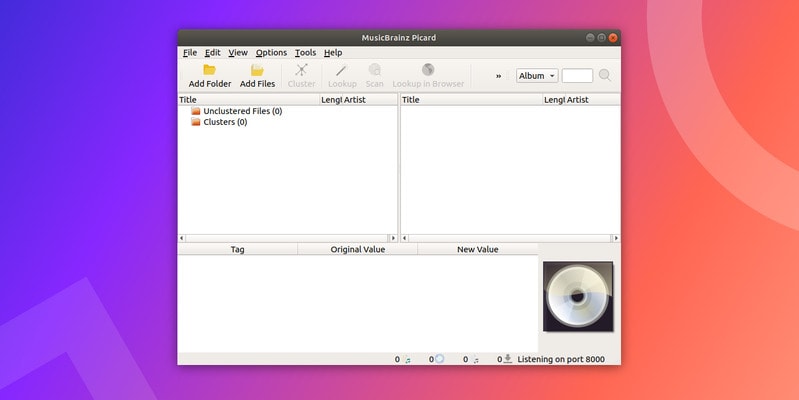The free and open source music tagging software, MusicBrainz Picard has released it’s version 2.0 six years after its last major release, 1.0, in June 2012. MusicBrainz Picard 2.0 comes with “many fixes and new features and much needed upgrades!”

MusicBrainz Picard is a cross-platform music tagging application that runs on Linux, Mac OS X and Windows. It allows you to clean your local music by automatically updating artist, album, track information and album art cover for each song.
MusicBrainz itself is a massive open source database of music. The MusicBrainz Picard tool uses this database to identify and tag your music. It checks the songs against the MusicBrainz database to see if it can find a match. If it can’t find a match, then it uses AcoustID (a database of audio fingerprints) in order to figure out the song.
This way “Track01.mp3” is correctly updated to “Real Song Title.mp3.”
It is written in Python, supports many audio file formats, can use audio fingerprints (AcoustIDs – used to compare records in the MusicBrainz database automatically), performs CD lookups and supports Unicode. The application is named after Captain Jean-Luc Picard from the TV series Start Trex: The Next Generation.
[irp posts=”17848″ name=”Nuclear Music Player for Multi Source Music Streaming in Linux”]
New features in Picard 2.0

Picard 2.0 comes with new changes with the major change being a switch in the dependencies. The new version has been ported to at least Python version 3,5 or PyQt 5.7. It now also includes HiDPI and Retina support and also many bug fixes.
Some of the major changes and bug fixes that can be seen in MusicBrainz Picard 2.0 includes:
- Now supports tagging DSF file
- Picard 2.0 supports only 64 bit
- A keyboard shortcut has been added for deleting scripts from options > scripting page.
- Improvements to User Interface
- Fixed saving tags for files on NAS devices
- Automatically overwrite existing cover art has been fixed
- Make multi-value script functions now work well
- Incompatible plugins can now be loaded with Picard 2.0
- Support for HiDPI and Retina
- Crashes when using the edit tag dialogue has been fixed
- Search crashes due to AttributeError has been fixed
- WAV files can now be opened
You can check out other changes and bug fixes in the MusicBrainz changelog.
Note should be taken that Picard 2.0 no longer supports Windows 32bit and the requirements for macOS have been increased to macOS 10,10 or newer. According to the release, they “will only be supporting 64-bit Windows officially because of lack of resources to build a 32-bit image.” The same reason has been brought forward for macOS. Hence, Picard 1.4.2 is the last version to support Windows 32 bit and macOS 10.7-10.10
The release also stated that downgrading from 2.0 to 1.4 may lead to configuration compatibility issues so users should make sure they have saved their Picard configuration before they use 2.0 if they want to go back to 1.4.
[irp posts=”16663″ name=”cmus: The Ultimate Music Player For Linux Terminal Lovers”]
Download MusicBrainz Picard 2.0
MusicBrainz Picard binaries are available for Debian, Gentoo, Arch Linux, Fedora, Ubuntu and openSUSE but they have not been updated to the latest Picard 2.0 yet.
Picard officially recommends using Flatpak on Linux but even the Flatpak has version 1.4.2 at the moment.
But if you are using Ubuntu 18.04, you are in luck. Picard 2.0 is available from the official PPA. You can install it using the following commands:
sudo add-apt-repository ppa:musicbrainz-developers/stable
sudo apt install picardYou can also install Picard 2.0 from the source code if you want. Source code can be found at its GitHub repository.
MusicBrainz Picard Source Code
Don’t hesitate to share your experience with us in the comment section if you have already started using Picard 2.0.

